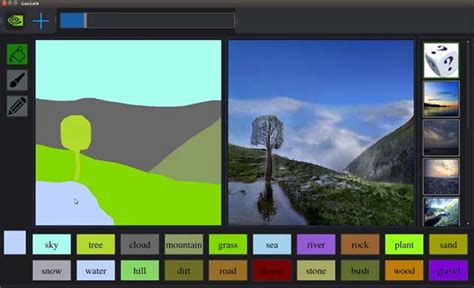Microsoft Paint has recently introduced a groundbreaking feature that leverages AI to enhance the artistic experience for users. By analyzing brushstrokes, the AI image generator builds upon the user’s input, offering a unique blend of creativity and automation. Despite the novelty and excitement surrounding this technology, user comments reflect a spectrum of opinions on its implications.
Commenters like ImAnAmateur find the AI tool valuable for enhancing one’s artistic endeavors, viewing it as a helpful addition to traditional painting techniques. The ability to incorporate one’s own brushstrokes into the final artwork adds a personal touch while benefiting from AI assistance. However, skeptics like dylan604 raise concerns about the authenticity of using AI to mimic talent, likening it to paint-by-numbers art that may lack genuine artistic merit.
While some users appreciate the convenience and precision that AI brings to digital art creation, others question the boundaries of AI intervention in the creative process. Commenter surfingdino speculates on the content screening and model training processes involved, pointing out potential liabilities and privacy implications. The debate extends to comparisons with traditional tools like oil paint, highlighting the unique ethical challenges posed by AI-infused software.
Moreover, the discussion delves into privacy issues and content moderation, as users express concerns about Microsoft’s data handling practices. The requirement for image validation on Microsoft servers raises questions about user privacy and data security. With the growing trend of AI-driven features in software applications, the balance between innovation and safeguarding user rights becomes a central theme in these dialogues.
Individual perspectives vary on whether the AI image generator in Microsoft Paint represents a step forward in digital artistry or a potential risk to user privacy. While enthusiasts appreciate the technological advancements and creative possibilities, critics voice apprehensions about the widening scope of AI influence in artistic expression. As AI continues to permeate creative tools, the need for transparent data practices and ethical considerations becomes increasingly crucial.
Alternatives like Krita with diffusion offer users a locally-run, privacy-focused solution for AI-assisted art creation, catering to individuals wary of data tracking and content moderation. The growing interest in open-source software like Krita underscores a preference for customizable and secure tools that prioritize user control over their artistic process. As artists seek innovative ways to merge traditional techniques with modern technology, the conversation around AI’s role in shaping artistic expression intensifies.
Ultimately, the integration of AI in Microsoft Paint represents a significant milestone in the evolution of digital art tools. While sparking debates on talent, creativity, and privacy, this innovation prompts a reevaluation of the ethical considerations surrounding AI-driven features. As users navigate the complex landscape of AI-powered art creation, the emphasis on user empowerment, privacy protection, and artistic integrity remains paramount in shaping the future of digital creativity.
By exploring the diverse perspectives and insights shared by users, we gain valuable insights into the multifaceted impact of AI technologies on artistic expression. As the boundaries between human creativity and machine assistance blur, the intersection of art and AI continues to provoke thought-provoking discussions on innovation, responsibility, and the evolving landscape of digital artistry.


Leave a Reply